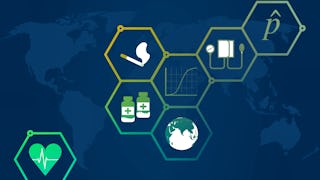This beginner-friendly course provides a comprehensive introduction to logistic regression, one of the most widely used techniques in data science and analytics. Learners will explain regression fundamentals, differentiate probability prediction methods, and analyze logistic regression key concepts including logit transformation, odds interpretation, and Maximum Likelihood Estimation (MLE).

Discover new skills with 30% off courses from industry experts. Save now.


What you'll learn
Explain logistic regression fundamentals, logit transformation, and odds interpretation.
Apply SAS PROC LOGISTIC for variable selection and predictive modeling.
Evaluate model performance using chi-square tests, concordance, and fit measures.
Skills you'll gain
Details to know

Add to your LinkedIn profile
September 2025
6 assignments
See how employees at top companies are mastering in-demand skills

There are 2 modules in this course
This module introduces learners to the fundamentals of regression and lays the groundwork for understanding logistic regression. Beginning with an overview of regression analysis, the module explores how dependent and independent variables interact, the role of coefficients, and the importance of error terms in modeling. Learners will examine practical applications of regression in real-world problem-solving and policymaking. The module then transitions into different probability prediction methods, highlighting when and why logistic regression is more appropriate than ordinary least squares (OLS). By the end, learners will have a solid conceptual foundation for applying logistic regression to binary outcomes in analytics and decision-making contexts.
What's included
8 videos3 assignments
This module deepens the learner’s understanding of logistic regression by focusing on key modeling concepts, practical approaches, and industry-standard methodologies. Learners will explore foundational ideas such as observation periods, validation samples, and outlier treatment before moving into logistic regression’s core principles, including the logit transformation, odds-to-probability conversion, and the importance of Maximum Likelihood Estimation (MLE). The module introduces practical approaches such as the Binning, Continuous, and Dummy Variable methods to improve model stability. Learners will then engage with SAS-based methodologies for variable selection, PROC LOGISTIC procedures, and evaluation techniques such as concordant/discordant pairs and global vs local measures of model fit. By the end of this module, learners will have the applied knowledge to build, evaluate, and refine logistic regression models in real-world data science and analytics contexts.
What's included
7 videos3 assignments
Earn a career certificate
Add this credential to your LinkedIn profile, resume, or CV. Share it on social media and in your performance review.
Explore more from Data Analysis
 Status: Free Trial
Status: Free Trial Status: Free Trial
Status: Free TrialUniversity of Michigan
 Status: Free Trial
Status: Free TrialUniversity of Colorado Boulder
 Status: Free Trial
Status: Free Trial
Why people choose Coursera for their career





Open new doors with Coursera Plus
Unlimited access to 10,000+ world-class courses, hands-on projects, and job-ready certificate programs - all included in your subscription
Advance your career with an online degree
Earn a degree from world-class universities - 100% online
Join over 3,400 global companies that choose Coursera for Business
Upskill your employees to excel in the digital economy
Frequently asked questions
To access the course materials, assignments and to earn a Certificate, you will need to purchase the Certificate experience when you enroll in a course. You can try a Free Trial instead, or apply for Financial Aid. The course may offer 'Full Course, No Certificate' instead. This option lets you see all course materials, submit required assessments, and get a final grade. This also means that you will not be able to purchase a Certificate experience.
When you purchase a Certificate you get access to all course materials, including graded assignments. Upon completing the course, your electronic Certificate will be added to your Accomplishments page - from there, you can print your Certificate or add it to your LinkedIn profile.
You will be eligible for a full refund until two weeks after your payment date, or (for courses that have just launched) until two weeks after the first session of the course begins, whichever is later. You cannot receive a refund once you’ve earned a Course Certificate, even if you complete the course within the two-week refund period. See our full refund policy.
More questions
Financial aid available,



